Background:
A wise gardener knows how to grow up plants and flowers healthily in the garden. Because he will use tools to analyze and improve the soil to provide the best growing environment for flowers, vegetables, etc. For example: use a soil nutrient sensor to detect the content of nitrogen, phosphorus and potassium in the soil. Check the pH of the soil with a soil pH tester. Knowing the pH of your soil can give you exactly what you can and can’t grow in your yard.
Although some plants can grow normally across a wide pH range, each plant has its own optimal soil pH range. For example, the optimum pH for tomato growth is 6-7, for corn it is 6.6-7.2, and okra does well in soils with pH up to 7.5.
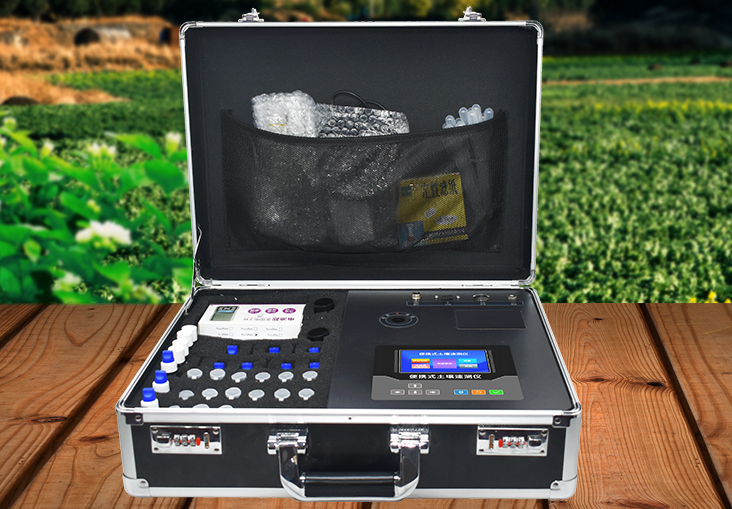
Why do you need a soil pH tester?
Insert the probe of the soil pH meter into the soil and it will directly tell you the current pH value of the soil. By measuring the value, you can consider what plants are best. Of course, if you want to grow your favorite flowers, you can create the most suitable soil environment by using fertilizers to improve the pH of the soil. Having a clear understanding of soil pH will ensure that plants thrive and produce better yields.
6 Best Soil pH Testers
In order to help every gardener have a top garden at home, we recommend the 6 best soil pH testers for you, introduce their characteristics and uses, and make it easy for you to choose the most suitable soil pH meter.
1. JXCT soil pH tester
This soil ph tester uses replaceable batteries, so it can be reused for a long life as long as the probe and housing are not severely damaged. Just click the on button and insert the stainless steel probe into the soil to get the pH value instantly. It measures range from 0 to 14, which means it can detect strongly acidic and alkaline soils. When working, the screen automatically lights up, which is convenient for users to obtain the value clearly.
The biggest advantage of this soil ph meter is its portability and high sensitivity. The size is 19.5×4.6cm, which is the same size as the palm of the hand, very small. You can carry it around in your toolbox to measure soil pH in different locations. It is powered by a battery, so the sensitivity is high, the measurement process does not need to wait, and there is no requirement for soil quality, which is very convenient. The price of this ph tester is very cheap, it is the best choice for managing garden soil at home, and it saves your budget greatly.
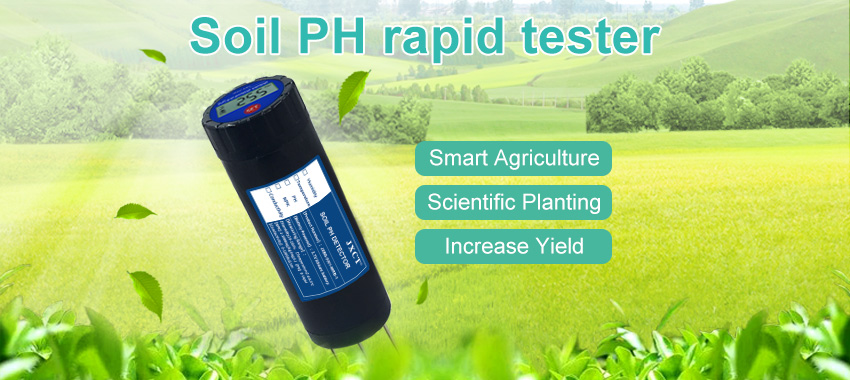
2. JXCT handheld soil pH meter
This soil pH meter consists of a soil pH sensor and a handheld analyzer. The value measured by the soil pH sensor can be displayed directly by the analyzer. The handheld analyzer has a storage function, which can store measurement data at different locations and at different times. The historical data is exported to the computer through the data line, which is helpful for data analysis and comparison. It can store 1 million pieces of data at one time, and can be reused after clearing.
The soil pH sensor as a measuring unit has high precision and sensitive response. Good waterproof, IP68 protection level. The recorder is powered by a rechargeable battery, which can work continuously for 8 hours when fully charged. This multi-channel recording ceremony can also be connected to a soil temperature and humidity sensor, soil EC sensor and soil NPK sensor, which can measure soil temperature, humidity, EC, nitrogen, phosphorus, potassium and ph values. Very powerful and a must-have tool for professional gardeners.
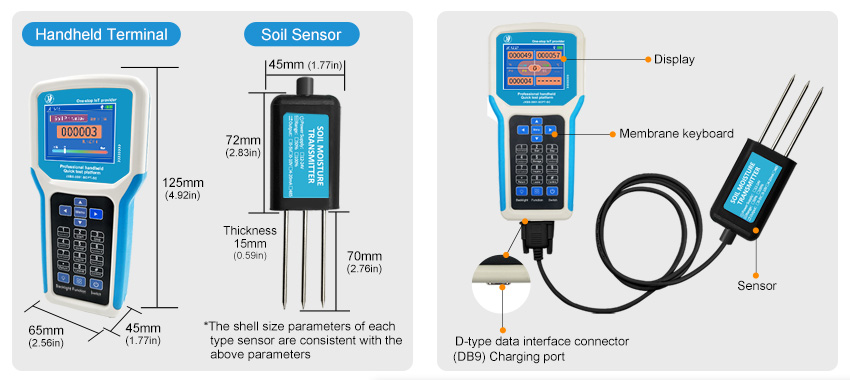
3.soil pH meter
If you are more concerned about the cost of the ph meter, then we recommend this ph meter for you. It will be a very simple and practical tool for you to use. First, you switch the switch to what you want to measure, then insert the probe 6 inches into the soil and wait patiently for about 10 minutes. After the pointer stops moving, you can view the measurement.
This ph meter does not require battery power, avoiding the trouble of power supply. It can measure humidity, ph or light. It can help you effectively improve the garden planting environment. Use this little device in a pot or in the garden to ensure your flowers grow better. The overall compact design greatly reduces the space occupation and is convenient for users to carry around. In addition, the manufacturer offers a variety of housing colors for you to choose from. This soil pH tester is currently the most popular soil acidity and alkalinity testing equipment.
4.Soil ph pen
This soil pH test pen uses laboratory-quality glass probes that measure pH in multiple locations. All you need to do is insert the probe into the test soil and make sure the soil is soft and free of obstructions. It measures pH at temperatures between 32 and 122F with a measurement range of 0-14. It can measure both the pH value in the soil and the pH value of the hydroponic solution.
Soil pH test pens require their own calibration and are fully temperature compensated so you get accurate readings every time. The backlit LCD display is easy to read and alerts you when the calibration time is correct. But the drift is very fast and requires cleaning and recalibration after every use to keep the specs accurate.
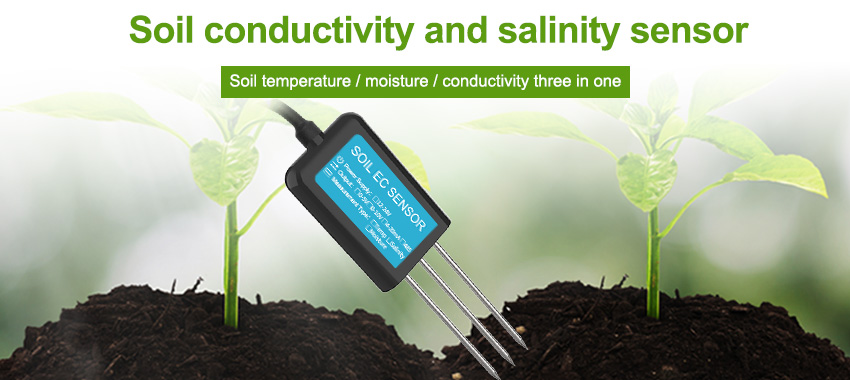
5.JXCT 3 in 1 soil sensor
The soil moisture sensor adopts the international new generation FDR measurement method, which can reach an accuracy of less than 3%; the electromagnetic non-contact measurement method, the soil moisture sensor will not drift with time, which greatly enhances the stability of the product and extends the service life.
6.Soil sensor
5 in 1 soil sensor is a soil all-in-one sensor independently developed by the company, which can simultaneously monitor soil temperature, soil moisture, soil pH, soil electrical conductivity (EC), soil nitrogen(N), phosphorus(P) and potassium(K). The soil all-in-one sensor(5 in 1 soil sensor) adopts a new generation of international TDR measurement method, and the detection accuracy can reach within 3%; the special metal probe greatly extends the service life of the product.
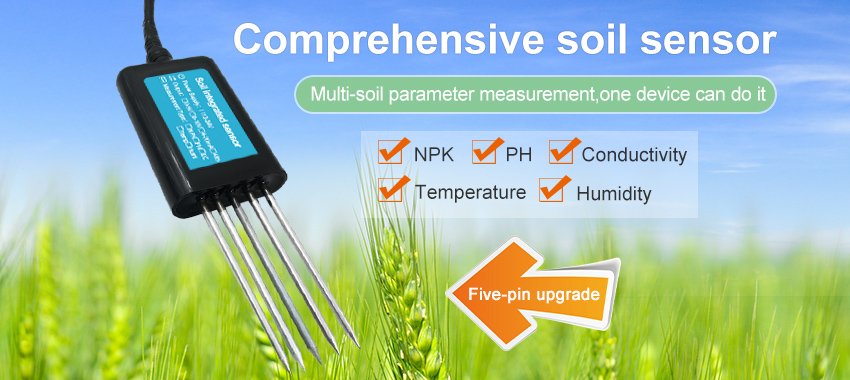
How to Raise and Lower Soil pH?
Soil pH indicates how acidic and alkaline the soil is. The pH range is 0-14, with a median of 7, so a pH of 7 is considered neutral. If the pH is less than 7, it means that the acidity is getting stronger and stronger. The pH value is greater than 7, which means that the alkalinity is getting stronger and stronger. Most plants prefer a pH between 6 and 7.5 (slightly acidic or slightly alkaline).
Do you have such questions? The best growth environment for the plants you want to grow is weakly acidic, but the garden soil you measure is alkaline, what should you do? In fact, the acidity and alkalinity of the soil can be fine-tuned manually. We can adjust the soil to the acidity and alkalinity suitable for the growth of target plants through scientific methods.
For acid soil adjustment, a certain amount of slaked lime can be added. The main component of slaked lime is calcium hydroxide, which is an alkaline substance. It is made by digesting quicklime with water, drying, sieving, and air-selecting. It can be used to neutralize acidic soil and improve soil structure. In addition, soil pH can also be adjusted by applying plant ash. The residue left after the burning of plants is grass ash, which can improve soil pH and increase soil nutrients.
For the adjustment of alkaline soil, acid fertilizers such as ammonium sulfate, ammonium nitrate, and ammonium chloride can be added to improve the affinity of the soil. Reasonable selection of fertilization, rational use of acidic fertilizers. In addition, agricultural machinery can be used to break the straw and evenly bury it in the ground. Deep plowing of soil can improve the permeability of the soil, and the straw can rot slowly after being buried in the soil, which can increase the content of soil organic matter, and then change the soil structure.
No matter which method is used to improve the acidity and alkalinity of the soil, it must be carried out in accordance with scientific and reasonable methods. Otherwise, it will not only fail to improve the soil structure, but may also damage the soil and affect plant growth.